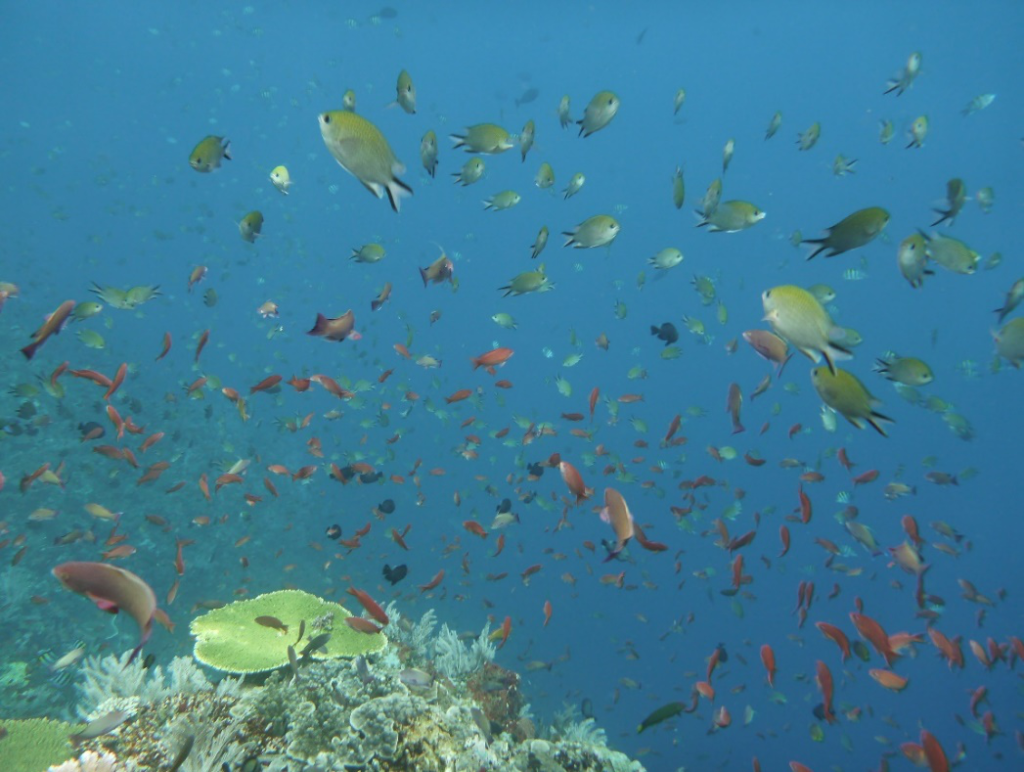A Drop of Hope from Indonesia
By Thomas Gomersall

Reef Fish in Komodo National Park (Thomas Gomersall)
Indonesia may not necessarily be the first place that springs to mind when one thinks of successful conservation, especially given its infamy as one of the world’s biggest palm oil producers. But when it comes to marine conservation, it may not be unfair to say that it should be considered a place of great significance. Not only are coral reefs in Indonesia and its neighbouring countries more resistant to bleaching, but now some scientists are saying that it could be leading the world in successfully tackling illegal fishing.
Traditionally, Indonesia has been a hotbed of illegal, unreported and unregulated (IUU) fishing, much of it by foreign vessels, costing the country $4 billion per year and helping to devastate its fisheries. In 2014, the Indonesian government banned foreign fishing in its waters as part of a wider set of fishing restrictions. Since then they have been actively, even aggressively making sure that the illegal fishermen get out and stay out, leading to the seizure and sinking of 300 ships found to have violated the bans. If passed, a bill submitted to the Indonesian parliament last month could see the corporate owners of captured foreign vessels face jail time along with the crews.
While these measures have certainly generated controversy, there are tentative signs that they are nonetheless achieving their goal of protecting fisheries. A study from earlier this year found a 90% decline in foreign fishing and a 25% decline in total fishing in Indonesia since the bans were implemented. They also predicted that under the IUU bans, local skipjack tuna fishermen could expect a 14% increase in their catch and a 12% increase in profit by 2035. The latter statistics are particularly significant with regards to fisheries management as typical management strategies normally lead to reductions in catch and profit, making governments and especially poor coastal communities reluctant to adopt them. But if the methods used by Indonesia could be successfully adopted elsewhere, they could represent a way for fish stocks to quickly recover without severely compromising the livelihoods of fishermen.
That being said, while there is cause to be (cautiously) optimistic for skipjack tuna, the status of fish stocks as a whole post-ban is still uncertain. The Indonesian fisheries ministry has noted a rise in domestic fishing as the foreign fleets become increasingly absent. Over 3000 new fishing boats are currently being built and by 2019 the government plans to have provided nearly 14,000 sets of fishing equipment to local fisherman. Left unchecked, this could undermine any success made through the bans on foreign fishing.
However, this need not be a disaster provided the proper measures are taken. Regulations on domestic fishing while providing alternative economic support could still allow fishermen to support themselves and their families without having to resort to IUU fishing. Better fishery data management to help to keep track of the state of fish stocks and relation to levels of domestic fishing and the impacts could be further reduced by banning destructive fishing equipment and methods such as trawling.
Happy World Oceans Day!
References:
Leave a Reply